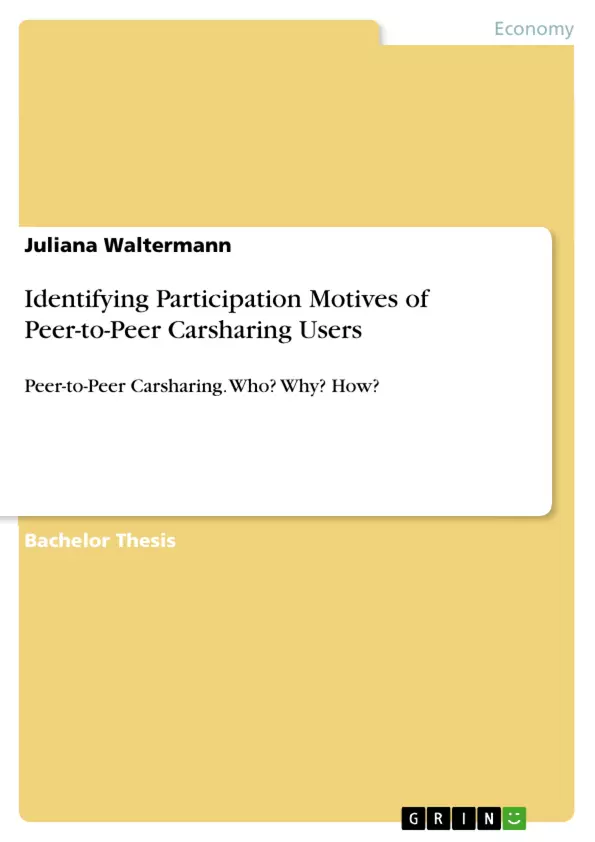In 2011, the American TIME Magazine described the "Sharing Economy" as one of the ten ideas that will change the world. The phenomenon, which encompasses the transformation of underutilized assets into productive resources, has not only fundamentally changed the daily lives of individuals; it has also substantially changed the business landscape. Business sectors, especially the dynamic automotive industry, have experienced a significant transformation. Therefore, managers must adapt their business strategy accordingly in order to stay profitable and meet the requirements of the future market.
Global trends such as an increase in economic and ecological awareness, fast technological improvements, traffic problems in megacities, as well as a change in the social importance of a car, have motivated people to search for alternative mobility solutions. Besides classical car rental, car-pooling, or car-leasing, carsharing is increasingly gaining worldwide attention. As the fastest-growing service among innovative mobility solutions, carsharing bears a high potential for business. The concept has a positive impact on the environment as it reduces car-ownership and supports the reduction of greenhouse gas emissions.
Furthermore, carsharing can help businesses and private organizations to overcome problems that emerge in megacities as it reduces traffic through the collaborative consumption of underutilized resources. Therefore, carsharing addresses current issues such as the increasing focus on efficient and sustainable business operations, logistical challenges in urban areas caused by the increasing population density and growth of megacities, and market saturation in industrialized countries.
Inhaltsverzeichnis (Table of Contents)
- Introduction
- Problem Specification and Relevance of Topic
- Problem Statement and Course of Investigation
- Research Background
- Sharing Economy
- Mobility Services
- Carsharing
- Forms of Carsharing
- Carsharing in the German Market
- Customers of Carsharing
- Methodological Background
- Means-End Chain Theory
- Basic Idea
- Elements of the Means-End Chains
- Data Collection and Analysis
- In-depth Interviews
- Laddering Technique
- Implementation
- Candidate Recruitment
- Procedure and Structure of the Interviews
- Content Analysis
- Results
- MEC Analysis and Implication Matrix
- Hierarchical Value Map
- Main Motivational Patterns
- Conclusion
- Implications
- Theoretical Implications
- Managerial Implications
- Future Research and Limitations
Zielsetzung und Themenschwerpunkte (Objectives and Key Themes)
This research aims to investigate the motivations of users participating in peer-to-peer (P2P) carsharing. It analyzes the factors driving people to choose carsharing over traditional car ownership or other mobility services. This study utilizes the Means-End Chain (MEC) theory to delve into the underlying values and aspirations of P2P carsharing users.
- The rise of the sharing economy and its impact on the automotive industry.
- The motivations of users participating in P2P carsharing.
- The application of Means-End Chain theory to understand consumer behavior.
- The implications of P2P carsharing for both business and society.
- The potential benefits and challenges of carsharing for the environment and urban mobility.
Zusammenfassung der Kapitel (Chapter Summaries)
- Introduction: This chapter outlines the problem statement, highlighting the increasing popularity of carsharing and its potential to transform the mobility landscape. It also discusses the relevance of understanding the motivations behind P2P carsharing participation.
- Research Background: This chapter provides an overview of the sharing economy, mobility services, and the emergence of carsharing as a significant mobility alternative. It focuses on the different forms of carsharing, its development in the German market, and the characteristics of carsharing users.
- Methodological Background: This chapter introduces the Means-End Chain theory, a framework for understanding the relationship between product attributes, consumer consequences, and personal values. It explains the basic idea of the theory and the key elements of Means-End Chains.
- Data Collection and Analysis: This chapter describes the research methodology, including the use of in-depth interviews, the laddering technique, and the process of candidate recruitment and data analysis.
- Results: This chapter presents the findings of the study, including the MEC analysis, the hierarchical value map, and the identification of key motivational patterns driving P2P carsharing usage.
Schlüsselwörter (Keywords)
This study focuses on the topic of carsharing within the context of the sharing economy. The primary keywords include: sharing economy, carsharing, peer-to-peer, Means-End Chain theory, consumer behavior, motivation, values, sustainability, urban mobility, and hierarchical value map. The research delves into understanding the motivations of carsharing users in the German market.
Frequently Asked Questions
What is Peer-to-Peer (P2P) carsharing?
P2P carsharing is a model where private car owners rent out their underutilized vehicles to other individuals through an online platform, part of the broader sharing economy.
What motivates people to use P2P carsharing?
Motivations include cost savings, ecological awareness, convenience in urban areas, and a shifting social value where access to a car is seen as more important than ownership.
What is the Means-End Chain (MEC) theory?
MEC theory is a research framework used to understand consumer behavior by linking product attributes to the functional and psychological consequences of use, and ultimately to personal values.
How does carsharing benefit the environment?
It reduces the total number of cars owned, which leads to lower greenhouse gas emissions and decreases the demand for parking and resources needed for car production.
What are the managerial implications of this study?
Managers in the automotive industry can use these insights to adapt their strategies, moving from selling products to offering mobility services that meet future market demands.
What is a Hierarchical Value Map in carsharing research?
It is a visual tool that maps the connections between carsharing features (like app usability) and the core values of the users (like freedom or sustainability).
- Citar trabajo
- Juliana Waltermann (Autor), 2016, Identifying Participation Motives of Peer-to-Peer Carsharing Users, Múnich, GRIN Verlag, https://www.grin.com/document/435397



